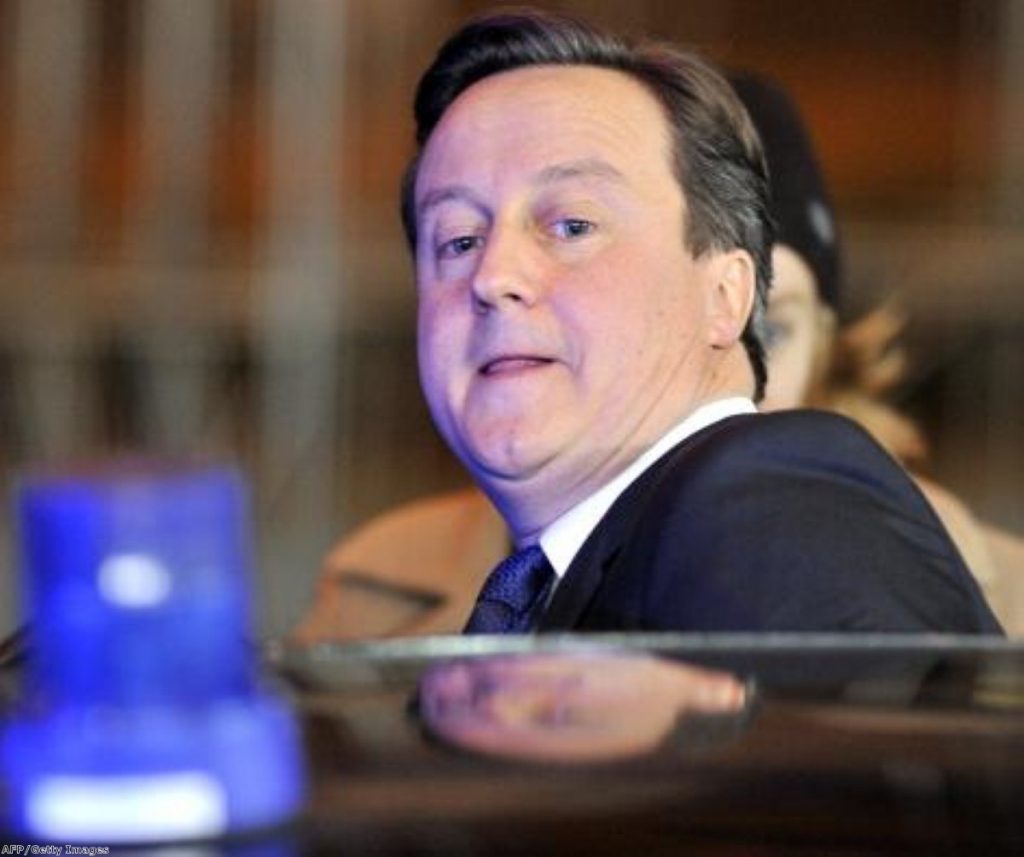The Tory civil war begins now
Article updated: See below
Now that the election is safely out the way, Tories can stop pretending they believe what David Cameron says. The prime minister has been dashing around European capitals recently, but most people know his game. It's theatre. He plans to come back with a modest proposal, defend it in the strongest possible terms, and campaign for a Yes vote.
Tory MP Steve Baker's launch of the new Conservatives for Britain initiative (absurd name, but what can you do) this weekend hinted at the lack of trust surrounding the prime minister's endeavour. After listing the areas the prime minister was ostensibly trying to secure agreement in, he wrote:
"Conservatives for Britain will be exploring the extent to which those goals have been met in the renegotiation package and whether they are sufficient to recommend EU membership to the British people."
He then added, in a polite but undeniably threatening way:
"We are a large and growing group from all generations of the parliamentary Conservative party. At our meetings in recent weeks, I have been struck by the dozens of Tory MPs who would vote to quit the EU now and who will not settle for anything less than fundamental change."
Compare and contrast that with Cameron's comments ruling out a free vote while at the G7:
"I've been very clear. If you want to be part of the government, you have to take the view that we are engaged in an exercise of renegotiation, to have a referendum, and that will lead to a successful outcome."
Asked if anyone in government who opposes that will have to resign, he replied:
"Everyone in government has signed up to the programme set out in the Conservative manifesto."
Far from being clear, Cameron is being rather slippery here. The manifesto stated:
"We will legislate in the first session of the next parliament for an in-out referendum to be held on Britain's membership of the EU before the end of 2017. We will negotiate a new settlement for Britain in the EU. And then we will ask the British people whether they want to stay in on this basis, or leave. We will honour the result of the referendum, whatever the outcome."
It did not say that the government would necessarily campaign for Britain to stay in the EU. That would only pertain once Cameron had successfully concluded his negotiations. Cameron's newfound authoritarianism suggests he has already decided the negotiations are a success before they have been conducted.
That makes sense, because he knows what we know: the negotiations are a myth. Angela Merkel told him well before the election – and probably before his Bloomberg speech – what he could and couldn't get. The rest is theatre. There was never any question of Cameron coming back to Westminster, saying 'I've failed', and campaigning to leave the EU.
So the position of holding a referendum has now transmuted into the position of supporting a Yes vote – at least for Cabinet ministers. And there are quite a few of those who will have been struck by the strength of the PM's tone, including Iain Duncan Smith, Theresa May, Chris Grayling, Michael Gove, Phillip Hammond, Oliver Letwin, Sajid Javid and John Whittingdale. It’s hard to imagine any of them voting to stay in the EU, although they'll have to if they want to preserve their career.
This morning was the first day of the Tory civil war. Conservatives for Britain are, in effect, calling Cameron's bluff. They are challenging the notion that he is best placed to evaluate the negotiation result he comes home with.
Cameron's G7 comment seeks to make his assessment of the negotiation and his colleagues' assessment interchangeable, when for very obvious reasons they should not be.
Those twin forces – one from Cabinet demanding discipline, another from Conservatives for Britain demanding close reading and principle – are likely to tear the party apart over the next two years.
And the reason for that is plain: Cameron never intended to deliver a reformed EU. He intended to park the issue so it couldn't damage him anymore. Tory backbenchers thought their interests were aligned with the prime minister, but the motive you have going into a problem will often define the solution you emerge with.
Does anyone even know what Cameron's aims are in the negotiation? A longer period before EU migrants can claim benefits? Protection for the City? Less regulation on business? It is all just tinkering. Euroscepticism is about the fundamental question of where power resides, not a managerial issue about regulatory excess. Cameron imagines he can address eurosceptics' grievances by tackling the effects of the EU, but it is the cause they care about.
We're still at the process stage of the EU referendum. But today we saw the formation of the two Tory camps which will tear themselves apart over it.
Update – 15:17 BST
Late this morning, the prime minister's spokesperson said Cameron had in fact been referring to the renegotiation process rather than the referendum itself, a point he made himself this afternoon during a press conference at the summit. Few journalists or onlookers have been convinced by the change in messaging.



